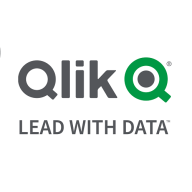

Informatica Intelligent Data Management Cloud (IDMC) and Qlik Replicate are leading products in the data management sector, focusing on integration and replication solutions. IDMC holds an edge with its comprehensive governance, cleansing, and flexible integration, while Qlik Replicate shines in real-time data replication and simplicity.
Features: Informatica IDMC offers robust data governance, cleansing, and address validation. Its flexible architecture supports seamless integration and various MDM styles. Qlik Replicate excels in efficient data replication, delivering real-time change data capture and seamless data synchronization, crucial for minimizing source performance impact and ensuring quick access.
Room for Improvement: Informatica IDMC faces challenges with SAP integration, data stewardship, and complex MDM database integrations. Issues with UI bugs and workflow need addressing. Qlik Replicate could enhance error insights, improve UI intuitiveness, and provide better scheduling capabilities, along with more comprehensive error messaging.
Ease of Deployment and Customer Service: Informatica IDMC offers flexible deployment with challenges in cloud transition speed. Customer service is detailed but varies in responsiveness. Qlik Replicate, suited for hybrid environments, benefits from timely support but sometimes lacks detailed issue tracking. Enhanced real-time support is desirable.
Pricing and ROI: Informatica's pricing is often top-market, involving complex licensing, yet significant ROI is noted. Higher costs accompany comprehensive solutions. Qlik Replicate's subscription pricing is expensive for smaller businesses, but direct licensing by data cores ensures efficient replication, promising long-term ROI by minimizing data impact.
We see return on investment from this solution in terms of time; time reduction or cost benefits is what we are getting very good results from.
I conducted a cost comparison with the AWS service provider, and this option is much cheaper than the Kinesis service offered by AWS.
Customers have seen ROI with Qlik Replicate because they get their data for analysis faster, enabling quicker decision-making compared to traditional data sourcing methods.
Due to the tool's maturity limitations, solutions are not always simple and often require workarounds.
The response time is pretty good because we have someone in-house, who is an expert from Informatica, in our team who can help us with any sort of queries usually.
If they are unsure how to resolve an issue, they keep customers informed, providing updates about progress and ensuring communication with the product team to deliver accurate responses.
Even priority tickets, which should be resolved in minutes, can take days.
Support response times could be improved as there are sometimes delays in receiving replies to support cases.
As a SaaS platform, IDMC is quite scalable and provides complete flexibility.
I find Informatica Intelligent Data Management Cloud (IDMC) to be a sustainable and scalable solution.
The system could be scaled to include more sources and functions.
Stability is crucial because IDMC holds business-critical data, and it needs to be available all the time for business users.
The tool needs to mature in terms of category-specific attributes or dynamic attributes.
I also want to see integration with other Informatica products, such as IICS, to leverage the metadata from EDC.
The licenses are too expensive compared to before, which is why customers are now preferring other data metadata management tools like OneTrust, Collibra, and Azure Purview.
It is a core-based licensing, which, especially in the banking industry, results in the system capacity being utilized up to a maximum of 60%.
Qlik Replicate could be improved in the next release by incorporating more monitoring options to monitor the logs.
It ranges from a quarter million to a couple of million a year.
The licenses are too expensive compared to before, which is why customers are now preferring other data metadata management tools like OneTrust, Collibra, and Azure Purview.
I think the costs are reasonable for the kinds of features that Informatica Intelligent Data Management Cloud (IDMC) has.
Licensing is calculated based on the machine's total capacity rather than actual usage.
For Qlik Replicate, the setup cost includes the requirement of a server, which represents the hardware cost that must be covered.
The platform's ability to pull in data from other platforms without the need for an additional integration tool enhances its appeal.
Informatica Intelligent Data Management Cloud (IDMC) can connect to pretty much any application, including Oracle Analytics and Power BI, and it works quite seamlessly.
In on-premise, we call it EDC for metadata management, while in cloud-based technologies, it is known as the Metadata Command Center, which serves the same purpose as EDC concerning CDGC.
The most valuable feature of Qlik Replicate is their change data capture feature.
Data retrieved from the system can be pushed to multiple places, supporting various divisions such as marketing, loans, and others.
| Product | Market Share (%) |
|---|---|
| Informatica Intelligent Data Management Cloud (IDMC) | 3.6% |
| Qlik Replicate | 2.3% |
| Other | 94.1% |


| Company Size | Count |
|---|---|
| Small Business | 42 |
| Midsize Enterprise | 24 |
| Large Enterprise | 134 |
| Company Size | Count |
|---|---|
| Small Business | 9 |
| Large Enterprise | 10 |
Informatica Intelligent Data Management Cloud (IDMC) integrates data quality, governance, and integration with flexible architecture. It supports multiple domains and a data models repository, delivering AI-enhanced data management across cloud-native platforms.
IDMC provides seamless integration and governance capabilities that support diverse data environments. Its comprehensive suite includes customizable workflows, data profiling, and metadata management. AI features, a data marketplace, and performance scalability enhance data management. While its interface poses challenges, its robust matching and cloud-native integration facilities are essential for complex data ecosystems. Users employ IDMC for connecting systems, ensuring data quality, and supporting data compliance but seek better pre-built rules, services, and improved connectivity, especially with platforms like Salesforce. Licensing, cost, and added AI functionalities are areas for potential refinement.
What are the key features of IDMC?IDMC is implemented across industries for data integration, metadata management, and governance. Organizations use it to connect systems, migrate data to cloud environments, and maintain data quality. They manage master data and automate business processes, facilitating data lineage and ensuring compliance with privacy regulations.
Qlik Replicate is a data replication solution for replicating data from one source database to another for business intelligence software. It offers data manipulation and transformations, replication without impacting source databases, and ease of use without needing ETL. The solution is stable and user-friendly, with detailed logging and support.
Qlik Replicate has improved the organization by allowing each team to replicate their data into a single-source data location. The most important feature of Qlik Replicate is its ability to replicate and update records without needing a programmer.
We monitor all Data Integration reviews to prevent fraudulent reviews and keep review quality high. We do not post reviews by company employees or direct competitors. We validate each review for authenticity via cross-reference with LinkedIn, and personal follow-up with the reviewer when necessary.